In today’s digital world, our smartphones are true treasure troves of private data. We use them for banking, online shopping, and store a lot of personal information on them. It’s no wonder that phones attract cybercriminals.
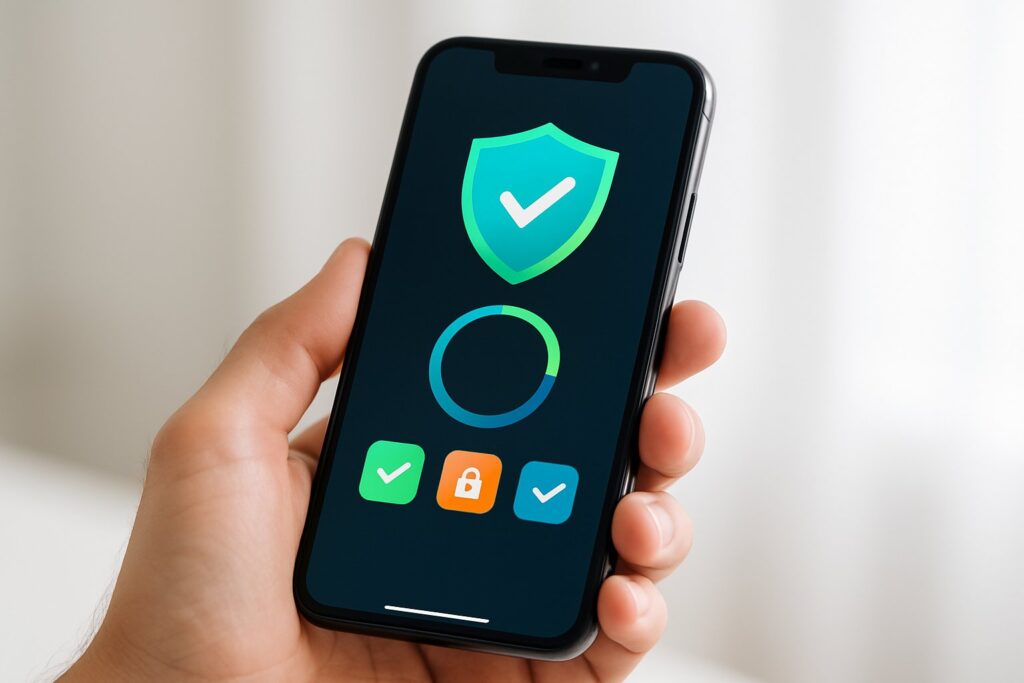
On the market, you will find plenty of antivirus applications for phones. Popular options such as Avast Mobile Security, Bitdefender Antivirus Free, or proposals from ESET are available in both free and paid versions. Many of them use cloud scanning – this allows threats to be detected without overloading the phone.
When choosing an antivirus, it’s worth looking at additional features. Modern antivirus applications are not just about protection against malware, but also privacy protection, application control, and security when using public Wi-Fi.
Key Takeaways
- An antivirus for phones protects against viruses, malware, and attempts to steal personal data.
- Free versions of antivirus software like Avast, AVG, or Bitdefender provide basic protection without straining the budget.
- Modern antivirus applications offer additional features such as Wi-Fi network scanning or privacy protection, which increases the overall security of the device.
What is an antivirus for phones and why is it needed?
An antivirus for phones is specialized software that protects smartphones from cyberattacks and malicious code. It serves as the first line of defense against digital threats that can harm your private data.
The Most Important Threats to Smartphones
Modern smartphones store vast amounts of sensitive personal data. This makes them a tempting target for cybercriminals. The most common threats include:
- Malicious applications – programs masquerading as legitimate applications
- Phishing – attempts to obtain data through fake websites and messages
- Ransomware – software that blocks access to the device and demands a ransom
- Exploits – taking advantage of vulnerabilities in the operating system
Antiviruses for phones inform about dangerous websites and applications before they cause trouble. Today’s malware can steal banking data, passwords, or even photos.
Threats evolve almost every day. Regular antivirus updates are therefore really important if you want to maintain security.
The Role of Antivirus Protection in Modern Mobile Devices
Installing antivirus on your phone is one of the key steps if you care about protecting your device and your data. Modern antivirus programs offer more than just fighting viruses:
- Monitor downloaded files and installed applications
- Block suspicious websites
- Protect connections on Wi-Fi networks
- Offer anti-theft features (location, remote blocking)
The operating system alone is not enough – system updates help, but an external antivirus really strengthens protection.
Types of Mobile Threats – Viruses, Malware, Ransomware, and More
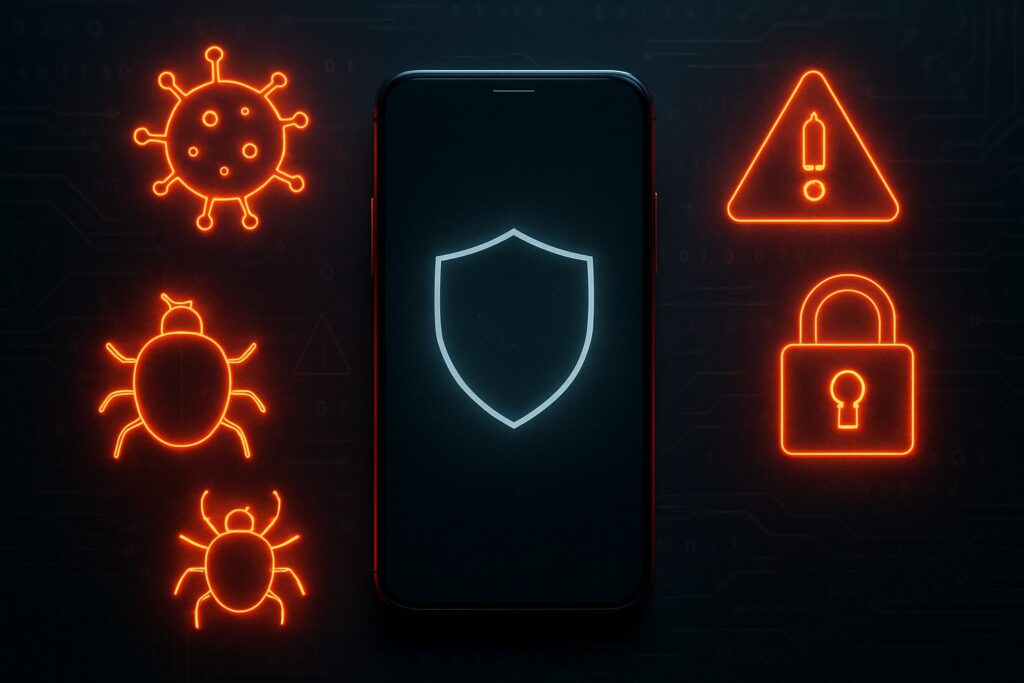
Android phones are exposed to many digital threats – from data theft to blocking access to the device. Attacks are becoming increasingly clever and harder to detect.
Viruses and Malware on Android
Malware is a broad term for malicious software: viruses, worms, trojans, and other nasties. They often hide in seemingly innocent applications.
Experts warn – as many as 60,000 Android applications could be used to inject malicious code. Such threats can:
- Steal personal data and passwords
- Display unwanted ads
- Slow down the phone
- Drain the battery and data transfer
The most commonly encountered types of malicious software are viruses, trojans, and worms. Viruses attach themselves to legitimate applications, trojans masquerade as useful programs, and worms spread themselves through the network.
Ransomware and Protection Against It
Ransomware is a type of malicious software that blocks access to the device or encrypts files, then demands a ransom for their decryption. For people who keep important data on their phones, this is a serious problem.
When ransomware attacks, a message appears on the screen demanding payment – usually in cryptocurrencies, as this makes it harder to catch the perpetrators.
How to protect against it? Here are a few things worth doing:
- Regularly back up – preferably in the cloud or on an external drive
- Do not click on suspicious links in SMS and emails
- Download applications only from official stores, like Google Play
- Use antivirus on your phone
Spyware and Tracking Software
Spyware is a type of threat that quietly tracks what we do on the device. It can record location, intercept messages, record calls, and even steal login data.
Spyware most often gets onto the phone through applications from untrusted sources or through email attachments. It can operate for weeks or months without showing any obvious signs of a problem.
What can suggest the presence of spyware?
- The battery and data package disappear faster than usual
- The phone heats up for no reason
- Strange sounds are heard during calls
- Applications start by themselves
A good antivirus should be able to detect and remove spyware, which provides some peace of mind about privacy.
Phishing and Cyberattacks Targeting Users
Phishing is a type of fraud where someone impersonates a well-known company or bank to obtain our data. On phones, it most often appears as a fake SMS, email, or strange notification.
Typical phishing looks like an urgent request to log into a bank or confirm data. The link leads to a site that pretends to be real but is not.
How to recognize phishing?
- Language errors in the content
- Strange email addresses of senders
- Requests for sensitive data
- Time pressure and threats like “we will block your account”
Vigilance is key – it’s worth checking who really sent the message before clicking anything. A good antivirus on the phone can warn against suspicious sites, which can save your skin.
How Does Antivirus Software Work on Phones?
An antivirus on a phone works on several levels. It protects the hardware from threats, detects and removes dangerous files, and monitors what is happening in the system. Detection methods are becoming increasingly clever, and the program itself operates more in the background than in the foreground.
Application Scanning and Threat Detection
Antiviruses use several methods to find suspicious things. The basis is scanning all applications and files for harmful code.
What does scanning look like?
- Comparing code with a database of known viruses
- Heuristic analysis – looking for unusual behaviors
- Checking what permissions applications have
The scanner regularly searches the phone’s memory. If it finds something dangerous, it gives the option to delete, quarantine, or ignore the threat.
Modern antiviruses warn during installation if an application seems suspicious. This is useful because sometimes it’s hard to assess whether something is safe.
Real-Time Protection Against Malware
Real-time protection is essentially the heart of the antivirus on the phone. The program constantly observes what is happening and reacts when something seems off.
What does such protection include?
- Blocking suspicious sites and internet connections
- Wi-Fi monitoring – warnings about insecure networks
- Blocking malicious SMS and emails
The antivirus operates in the background, checking every new application or file. If it detects something, it immediately blocks the threat and notifies the user.
Better programs can also recognize phishing, attempts to steal data, or the installation of spyware before they can cause harm.
The Most Popular Antivirus for Phones – Overview and Features
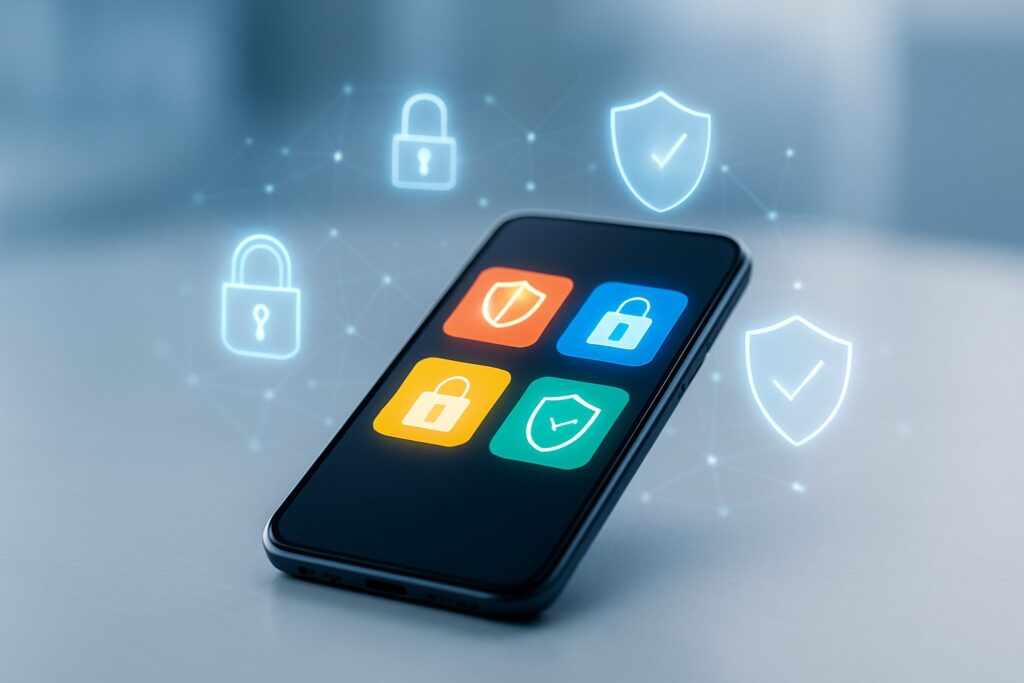
On the market, we can find plenty of antivirus applications for phones. The best ones not only protect against viruses but also offer additional options that enhance security.
Avast, AVG Antivirus, and Bitdefender Mobile Security
Avast Mobile Security is a really comprehensive tool – it allows you to scan the device, protect privacy, and secure Wi-Fi networks. The application also has an app lock and monitors the security of online accounts.
AVG AntiVirus, which belongs to the same company as Avast, offers similar features. It protects against viruses, allows blocking dangerous applications, and has a Wi-Fi scanner.
Bitdefender Mobile Security stands out with a strong antivirus engine – it effectively recognizes new threats. Bitdefender protects privacy, secures mobile banking, and helps in case of phone theft.
Kaspersky and Other Leading Antivirus Programs
Kaspersky Mobile Antivirus is a proven antivirus program that provides solid protection against malicious software. The product version includes features for blocking unwanted calls and filtering SMS.
McAfee Mobile Security protects against viruses and helps maintain privacy. It also allows you to locate your phone if you lose it or someone steals it.
Norton Mobile Security is another strong solution for phones. The program effectively scans applications for privacy threats and blocks dangerous websites.
AhnLab V3 Mobile Security, though less known, offers advanced protection against various mobile threats and does not slow down the device.
Key Features of Antivirus Software for Mobile Devices
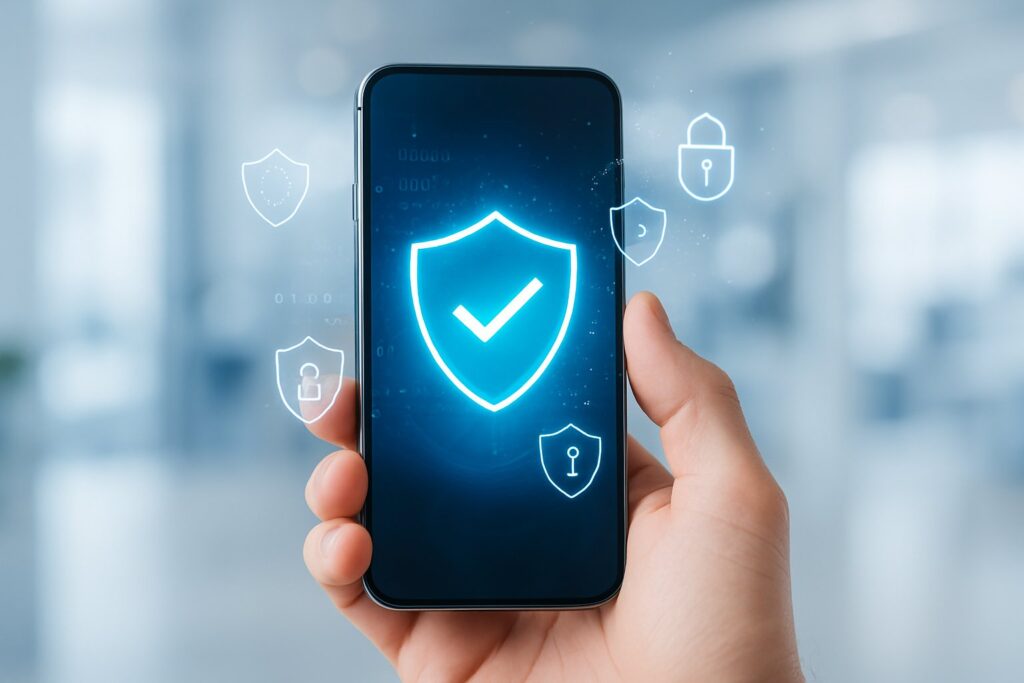
Modern antiviruses for phones do much more than just block viruses. They protect privacy, data, and help ensure the physical security of the device.
Privacy Protection and Data Security
A good mobile antivirus should protect the user’s privacy. Real-time scanning works in the background and detects threats before they can cause any damage.
It’s also worth paying attention to application lock, which allows you to secure selected programs with a password – ideal if you have sensitive data there.
Advanced antiviruses detect:
- Malicious software (malware)
- Spyware
- Ransomware
Applications like Avast Mobile Security also offer data security monitoring and scanning for system vulnerabilities. This really helps maintain privacy.
VPN and Secure Internet Browsing
An integrated VPN in the antivirus provides an additional layer of protection while surfing the web. It encrypts the connection, so even on public Wi-Fi, your data is safer.
Secure browsing warns against suspicious sites and blocks access to fake phishing sites. It’s like a virtual shield during everyday internet use.
Wi-Fi protection scans available networks and warns against connecting to unsecured access points.
Some applications also offer call and SMS filtering, which protects against spam and phishing attempts.
Theft Protection and Tracking
The anti-theft module allows you to remotely lock the device if you lose it or someone steals it.
Phone location enables quick finding of lost equipment on the map. If necessary, you can also:
- Turn on a loud alarm
- Take a picture of the person trying to unlock the phone
- Wipe data to prevent it from falling into the wrong hands
Advanced antiviruses also block applications that track activity and detect unauthorized access to the microphone, camera, or location data.
An interesting option is the configuration of safety zones – you receive a notification when the device leaves a specified area.
Recommendations for Choosing and Configuring Antivirus for Phones
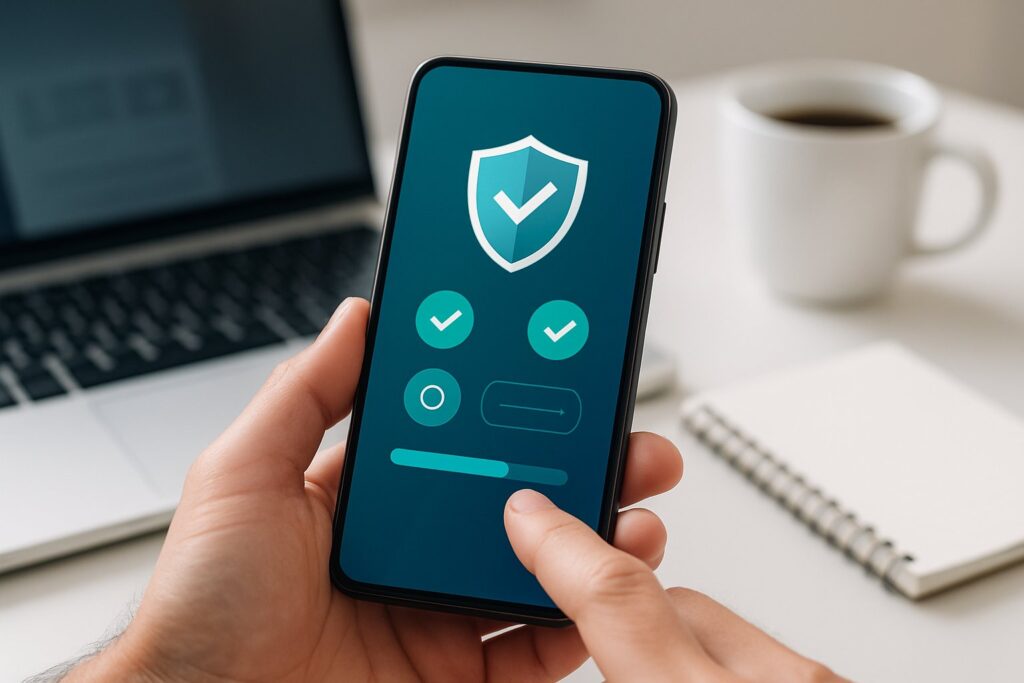
Choosing an antivirus for your phone is not a decision to be made in five minutes. It’s worth reviewing the features and parameters of available solutions. Proper configuration really makes a difference in everyday security.
What to Pay Attention to When Choosing an Antivirus Application
It’s best to opt for proven antivirus applications from reputable manufacturers – Avast, Bitdefender, Kaspersky. Reviews from other users or recommendations from friends can also be helpful.
What should you pay attention to?
- Real-time protection – monitoring installed applications
- On-demand scanning – the ability to manually check the phone
- Privacy protection – securing personal data
- Low impact on battery – the application shouldn’t drain all the energy
Also take a look at the license period and subscription prices. Some applications provide basic protection for free, while additional features require payment.
Some experts suggest installing two antivirus programs for better protection, although not everyone agrees with this.
The Importance of Updates and Security Patches
Without regular updates, even the best antivirus won’t be effective. Every application requires current security patches that protect against new threats.
It’s worth enabling automatic updates to ensure you’re using the latest version. Manufacturers often improve their applications because threats are constantly changing.
It’s also good to disable battery optimization for the antivirus – then the program runs in the background without interruptions. Here are some practical tips:
- Check for updates at least once a week
- Ensure the application can run in the background
- Update the phone’s operating system
- Verify the virus database in the antivirus application
The Impact of Antivirus on Phone Performance and Network Security
Antiviruses on phones have a dual job: they protect the hardware from threats while also using its computing power. How much they affect performance and network security depends on several factors that are worth considering before installation.
Performance Optimization and Resource Usage
There’s no denying it – some antiviruses can slow down the phone, especially during system scans. Sometimes just one heavier application can make a difference in smoothness.
Fortunately, more and more antiviruses have energy-saving and memory-saving modes. It’s worth checking if the chosen program offers such an option, as not all do.
Applications running in the background can drain the battery faster and take up a lot of RAM. Regular updates of virus databases also put some load on the system, but without them, protection makes no sense.
When choosing an antivirus, it’s good to opt for one that won’t bog down the phone. Not every program is lightweight, so it’s better to check reviews before installation.
Security While Using Wi-Fi and Encryption
A good antivirus will not only detect a virus but also ensure network security. Wi-Fi monitoring features can warn against strange networks or attempts at attacks.
Some applications have built-in VPNs that encrypt the connection. This is really useful, especially when using public Wi-Fi in a café or at a train station.
Modern antiviruses have many interesting mechanisms to help you navigate the web safely. Among them, you will find:
- Blocking suspicious sites
- Protection for banking transactions
- Shield against phishing
- Privacy control in applications
When choosing an antivirus, it’s worth paying attention to the Wi-Fi scanning feature. This makes it easier to avoid untrusted networks and potential threats.
Frequently Asked Questions
Many users have questions about antivirus for phones. Below you will find answers to the most frequently asked ones.
What is the best free antivirus for phones?
Among free options, Bitdefender Antivirus Free, AVG Free Antivirus, or Avast Mobile Security are most often recommended. They provide basic protection against viruses and do not require payment.
AVG and Avast are particularly popular because they regularly update their virus databases. This increases the chances of detecting new threats.
Is it necessary to install antivirus on an Android phone?
It is not absolutely mandatory, but it is definitely worth it. Android is more exposed to attacks than iOS, mainly due to its openness.
If you only install applications from Google Play and do not click on suspicious links, the risk is lower. However, an antivirus provides an additional layer of protection, which can be useful as threats become increasingly clever.
How can I check if my phone already has antivirus installed?
The easiest way is to go into settings and review the list of applications. Some phones, like Samsungs, already have factory-installed security.
You can also check the “Security” or “Device Protection” section in the settings. If you don’t see any information about antivirus there, you probably don’t have it installed.
Do free antiviruses for phones offer sufficient protection?
Free programs protect against the most common threats, detecting known viruses and malware. However, their features can be limited.
Paid versions offer more, such as privacy protection or better banking security. For most users, a free antivirus is sufficient, although if you keep sensitive data on your phone, it’s better to consider a premium version.
What protective features should a good antivirus for phones have?
A good antivirus should have real-time protection, file and application scanning, and phishing detection. Wi-Fi protection and blocking dangerous sites are also useful.
Additionally, look for options such as privacy protection, theft protection, or battery optimization. The best applications also protect against spying and ransomware.
How often should I update the antivirus on my phone?
It’s best to update the antivirus on your phone daily, preferably automatically. Such regular updates help protect against new threats and harmful software that appears almost constantly.
Most modern antivirus applications automatically download updates as long as the phone is connected to Wi-Fi. It’s worth checking the application settings to ensure that automatic updates are indeed enabled. As for minimum system requirements, the latest antiviruses usually require Android 9.0 or newer.
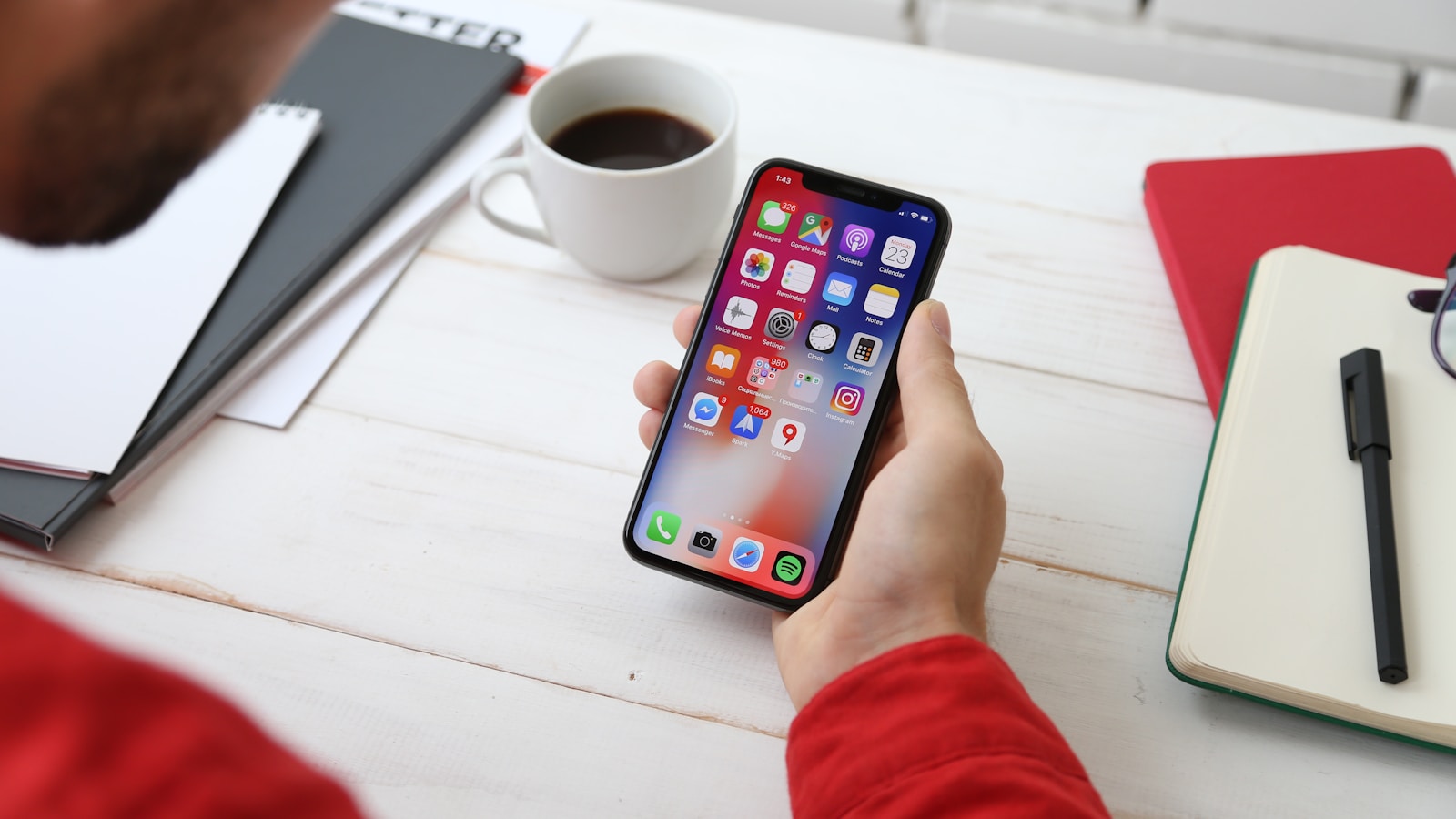
Leave a Reply